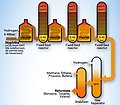Polymerization (redirect from Polymerisation)
In polymer chemistry, polymerization (American English), or polymerisation (British English), is a process of reacting monomer molecules together in a...
14 KB (1,444 words) - 20:58, 14 December 2024
chemistry, polymerisation inhibitors (US: polymerization inhibitors) are chemical compounds added to monomers to prevent their self-polymerisation. Unsaturated...
7 KB (785 words) - 09:28, 26 May 2024
Type of chain-growth polymerisation reaction involving cyclic olefins...
8 KB (779 words) - 08:08, 9 December 2024
Degree of polymerization (redirect from Degree of polymerisation)
The degree of polymerization, or DP, is the number of monomeric units in a macromolecule or polymer or oligomer molecule. For a homopolymer, there is only...
6 KB (756 words) - 01:11, 7 April 2024
Chain-growth polymerization (redirect from Addition polymerisation)
Chain-growth polymerization (AE) or chain-growth polymerisation (BE) is a polymerization technique where monomer molecules add onto the active site on...
23 KB (2,674 words) - 16:46, 29 July 2024
Radical polymerization (redirect from Radical polymerisation)
and biocompatibility. Anionic addition polymerization Chain-growth polymerisation Chain transfer Cobalt-mediated radical polymerization Living polymerization...
46 KB (5,483 words) - 08:58, 20 December 2024
Living polymerization (redirect from Living polymerisation)
In polymer chemistry, living polymerization is a form of chain growth polymerization where the ability of a growing polymer chain to terminate has been...
37 KB (4,445 words) - 05:32, 3 June 2024
Ionic polymerization (redirect from Ionic polymerisation)
IUPAC definition Chain polymerization in which active centers are ions or ion pairs. Note 1: Usually the chain-ends are ions, although ions can also be...
7 KB (791 words) - 20:50, 21 October 2023
Condensation polymer (redirect from Condensation polymerisation)
In polymer chemistry, condensation polymers are any kind of polymers whose process of polymerization involves a condensation reaction (i.e. a small molecule...
6 KB (621 words) - 04:02, 20 October 2024
exothermal ring-opening polymerisation without releasing any chemical, which translates in near zero shrinkage upon polymerisation. Thermosetting polymer...
14 KB (1,744 words) - 12:24, 28 August 2024
Plasma polymerization (redirect from Plasma polymerisation)
Plasma polymerization (or glow discharge polymerization) uses plasma sources to generate a gas discharge that provides energy to activate or fragment gaseous...
35 KB (4,569 words) - 05:00, 10 July 2023
Step-growth polymerization (redirect from Step-growth polymerisation)
Examples of monomer systems that undergo step-growth polymerisation. The reactive functional groups are highlighted....
28 KB (3,709 words) - 07:02, 8 September 2024
Ring-opening polymerization (redirect from Ring-opening polymerisation)
transferring an alkyl chain to another polymer. Ring-opening metathesis polymerisation (ROMP) produces unsaturated polymers from cycloalkenes or bicycloalkenes...
20 KB (2,268 words) - 04:31, 21 November 2024
Alkene (redirect from Olefin polymerisation)
Shapiro reaction). The formation of longer alkenes via the step-wise polymerisation of smaller ones is appealing, as ethylene (the smallest alkene) is both...
48 KB (5,160 words) - 20:06, 22 December 2024
Anionic addition polymerization (redirect from Anionic addition polymerisation)
IUPAC definition anionic polymerization: An ionic polymerization in which the kinetic-chain carriers are anions. In polymer chemistry, anionic addition...
16 KB (1,844 words) - 07:30, 14 December 2024
decreases the rate of a chemical reaction Polymerisation inhibitor, a substance that inhibits unwanted polymerisation of monomers Cognitive inhibition, the...
2 KB (271 words) - 19:42, 25 May 2023
and mechanical properties known as polyphosphazenes produced from the polymerisation of hexachlorophosphazene. Hexachlorophosphazene is a cyclic molecule...
23 KB (1,914 words) - 11:53, 14 November 2024
distillation Catalytic cracking Catalytic reforming Alkylation Isomerisation Polymerisation Hydrodesulphurisation Sweetening Hydrocracking Solvent deasphalting...
5 KB (758 words) - 19:47, 5 November 2024
distillation Catalytic cracking Catalytic reforming Alkylation Isomerisation Polymerisation Hydrodesulphurisation Sweetening Hydrocracking Solvent deasphalting...
26 KB (3,036 words) - 23:45, 4 September 2024
Emulsion polymerization (redirect from Emulsion polymerisation)
In polymer chemistry, emulsion polymerization is a type of radical polymerization that usually starts with an emulsion incorporating water, monomers, and...
25 KB (3,393 words) - 13:34, 4 October 2024
Acetone (section Polymerisation)
Kargin, V. A.; Kabanov, V. A.; Zubov, V. P.; Papisov, I. M. (1960). "Polymerisation of acetone". Doklady Akademii Nauk SSSR. 134 (5): 1098–1099. Kawai,...
48 KB (4,849 words) - 21:04, 23 December 2024
Imine (section Polymerisation)
(polyimines) can be synthesised from multivalent aldehydes and amines. The polymerisation reaction proceeds directly when the aldehyde and amine monomers are...
24 KB (2,710 words) - 22:36, 16 November 2024
ions in the polymerisation sub-unit, and the structural-chemical distortion of the polymerisation unit effectively stalls the polymerisation process by...
32 KB (3,700 words) - 00:38, 1 January 2024
Lebedev's main works are devoted to polymerisation of diene hydrocarbons. He was the first to research the polymerisation of butadiene (1910–1913). In 1910...
7 KB (564 words) - 18:42, 7 December 2024
items. In 1920, Hermann Staudinger published his seminal work "Über Polymerisation", in which he proposed that polymers were in fact long chains of atoms...
73 KB (7,844 words) - 19:37, 21 September 2024
A silicate is any member of a family of polyatomic anions consisting of silicon and oxygen, usually with the general formula [SiO(4-2x)− 4−x] n, where...
11 KB (1,234 words) - 00:33, 15 November 2024
solid with the approximate formula (HNCO)x. It is the product of the polymerisation of cyanic acid together with its cyclic trimer cyanuric acid. It is...
1 KB (78 words) - 12:07, 27 July 2019
The dextrose equivalent gives an indication of the average degree of polymerisation (DP) for starch sugars. As a rule of thumb, DE × DP = 120. In all glucose...
3 KB (364 words) - 12:40, 5 December 2024
distillation Catalytic cracking Catalytic reforming Alkylation Isomerisation Polymerisation Hydrodesulphurisation Sweetening Hydrocracking Solvent deasphalting...
3 KB (281 words) - 17:08, 9 February 2024
asteroid. The most likely explanation is a combination of two effects, the polymerisation of hydrogen cyanide and a phase transition of amorphous water ice, which...
117 KB (11,385 words) - 15:18, 22 December 2024















